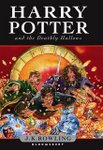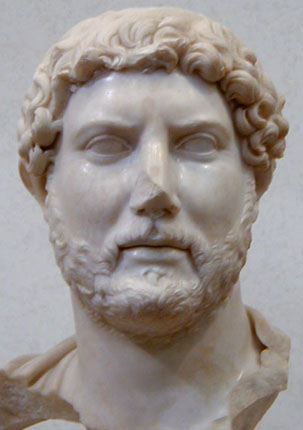The Kenilworth Public Library is located on Smalley Place, near the top of Warwick Road, Kenilworth’s main shopping street. In World War II, a German bomb fell short of Coventry and destroyed the historic buildings that stood on the site, clearing the way for the enormously out-of-place De Montfort Hotel and the bland, utilitarian public library. The library has a small collection of fiction, but library card holders have access to the much more extensive holdings of the entire Warwickshire library system. There is a £1 fee for each item requested from another county library. I’m expecting to spend many pounds requesting books this year, but this time I was lucky. The Kenilworth Public Library owns a copy of Rose Macaulay’s The World My Wilderness (1950).
 Rose Macaulay (1881-1958) was born in Rugby, here in Warwickshire, but moved with her family to Italy when she was six. Although she returned to England to live as an adult, her foreign upbringing (so her biographers say) gave her a cool detachment which made her a brilliant satirist of the English and their ways. There are often cool, detached, observant women in her novels, like Helen in The World My Wilderness. She also creates female protagonists with sexually ambiguous names—most famously Laurie (which, in England, was once primarily a male name) in her masterpiece, The Towers of Trebizond (1956). In her novel from the 1920s, Crewe Train, the protagonist is a girl named Denham who was raised in Andorra and then exposed to alien and sophisticated London society. That theme of alienation from polite English society is revisited in The World My Wilderness.
Rose Macaulay (1881-1958) was born in Rugby, here in Warwickshire, but moved with her family to Italy when she was six. Although she returned to England to live as an adult, her foreign upbringing (so her biographers say) gave her a cool detachment which made her a brilliant satirist of the English and their ways. There are often cool, detached, observant women in her novels, like Helen in The World My Wilderness. She also creates female protagonists with sexually ambiguous names—most famously Laurie (which, in England, was once primarily a male name) in her masterpiece, The Towers of Trebizond (1956). In her novel from the 1920s, Crewe Train, the protagonist is a girl named Denham who was raised in Andorra and then exposed to alien and sophisticated London society. That theme of alienation from polite English society is revisited in The World My Wilderness.As a classicist, I find Helen an especially interesting character. Her name brings to mind Helen of Troy; like her classical namesake, Macaulay's Helen has left her aristocratic husband to run away across the sea with a foreign lover (in this case, a French merchant from Perpignan). Helen spends her days translating Greek comedies into French, and is described variously as a Venus, a Cleopatra, and a lotus-eater. When her daughter was little, she told her classical bedtime stories: "Perseus and Andromeda, the Golden Fleece, Theseus and the Minotaur, something out of Herodotus." As for religion: "I can't think, if people want gods, why not the Greek ones; they are so useful in emergencies, and such enterprising and entertaining companions." At one point in the novel, her son finds her forging medieval Provencal poetry for publication; she tells him she might try her hand at a classical hoax next: "I might discover a page or two of one of the lost books of Livy next... Or a treatise of Varro's, or some letters from Atticus to Cicero. But I'm afraid classical scholars are too smart." She admits that her morals, scholarly as well as sexual, are shockingly loose.
In The World My Wilderness, the protagonist is Helen's daughter Barbary, a seventeen-year old girl who has lived with her English mother in southern France throughout the German occupation. Her French stepfather collaborated mildly with the Germans, while she and her step-brother moved through the dangerous underground world of the maquis, the French Resistance. She is furtive and half-wild and physically and emotionally scarred from her wartime experience. Although she loves her mother, something unspoken has come between them and damaged their relationship. When Helen sends her to London to live with her upright father, a KC, Barbary doesn’t take well to civilization, and goes feral the post-blitz ruins around St. Paul’s. The ruins are a powerful symbol for Macaulay—she wrote a non-fiction book titled The Pleasure of Ruins—as is St. Paul’s itself, rising solid and white above the wreckage of the war. As she grew older, Macaulay turned increasingly to the church. The Towers of Trebizond chronicles a spiritual journey in the form of a travel narrative, as Laurie struggles toward the elusive towers that represent forgiveness and reconciliation with God.
Macaulay’s 1923 novel Told By an Idiot begins with the family patriarch losing his faith and giving up his comfortable living as an Anglican clergyman. In the course of the novel, he loses his faith many times, only to rebound into another faith—Methodist, High Church, Low Church, Swedenborgian. His life is a long, restless, but somehow satisfying spiritual quest for the true religion. When he dies, one of his daughters reflects that at least now that he’s in heaven he’ll know the truth. Her cool, detached sister remarks that, since he was so happy continually losing and gaining his religious faith, perhaps heaven for him will be a continuation of the same pattern. Macaulay herself, though drawn toward the reassuring rituals and creeds of the church, seems to prefer ambiguity and uncertainty, or at least to recognize that certainty is impossible for humans to achieve and dangerous for them to claim.


No comments:
Post a Comment